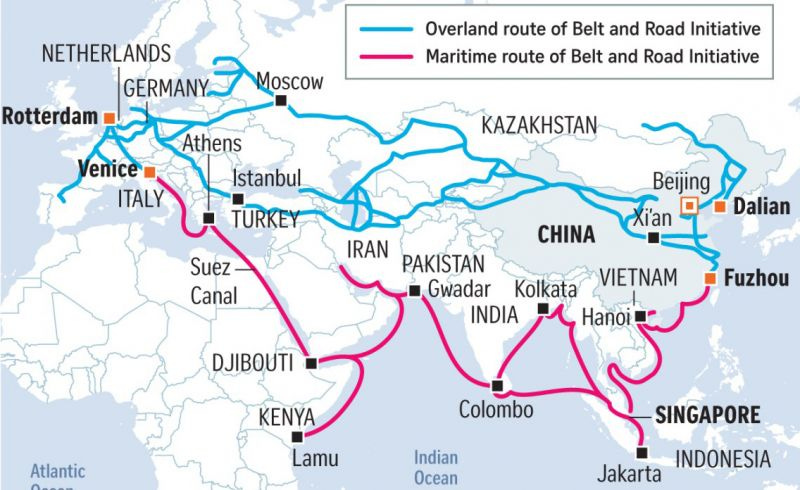Which Foreign Policy Paradigm for the USA? Hegemony and Annihilation or Restoration of Sanity?
TRANSCEND MEMBERS, 16 Dec 2024
Matthew Ehret Insights – TRANSCEND Media Service
10 Dec 2024 – Compared to the great initiatives taken on behalf of freedom and anti colonialism throughout the past 260 years, the United States of America of the past several decades appears to be a strange and foolish creature running roughshod over the dignity of people and nations in a race for mass nuclear extermination.
A renewed Cold War hysteria has been stirred up, which is quickly turning hot, as Lavrov warned in a recent speech that we are now closer to thermonuclear war than we were during the Cuban Missile Crisis of 1963. Today’s Cold War revival exhibits a rabid anti-Chinese/Russian paranoia despite the fact that both nations have repeatedly called for cooperation and friendship with the USA for years.
From the recent fall of Syria to CIA-backed terrorists, escalating military maneuvers on Russia’s border, to belligerent military expansion in China’s backyard, to radical Zionists pushing for war with the entire Arab world, it seems that everywhere one looks, we find the same lemming-like commitment to playing a nuclear game of chicken in the hopes of psychologically breaking the Multipolar Alliance led by Russia, China and a growing array of nations taking part in the ever-growing Belt and Road Initiative.

Trump is the first president in decades that has invoked the prospect of restoring the American System tariff policy last seen over a century ago, with a focus on economic development and win-win cooperation abroad.
But is Trump capable, competent or honest enough to get these objectives enacted?
Are the monetarist Wall Street cultists, Soros regime change acolytes and Zionist warmongers too much for Trump, or might their insane agenda to light the world on fire be overcome by patriots today?
China’s former Ambassador to Washington Cui Tiankai recently acknowledged this threat of a world war between China and the USA, but took the high road calling for reasonable dialogue, saying, “China and the USA need to recapture the spirit of cooperation from WWII and join hands to confront our common enemies in the new era.”
In the same speech, it is ironic that the Chinese Ambassador quoted America’s martyred president in that same speech, saying, “the best way to predict the future is to create it”.
With these words in mind, let us revisit the two opposing global policy options the USA had available to it at the turn of the last century while the Civil War hero William McKinley still presided in the office of the presidency in 1901.
At this crucial moment in world history, it was still undetermined whether America would hold on to its anti-imperial traditions or embrace a new imperial identity.
The Last Lincoln Republican
In 1901, speaking at the Pan-American Exposition, which featured grand visions of rail grids connecting all of the Americas driven by national banking, protectionism and bilateral treaties, McKinley stated his vision for a new age of win-win cooperation that was then emerging[1]:
“The Tower of Light is the tower of peace and good will, whose turrets already appear above the horizons of the future. Science, discovery, and industry are the great, immortal democrats whose teaching shall wipe out political boundaries, and heal national jealousies, and sweep hitherto hostile units into the great current of a commonweal. Monarchies and oligarchies cannot prevail against them, for they find a place for every man and bring him to it in freedom and self-respect. We shall have all America united; and what America becomes is the prototype of what the world must be.”
In an earlier 1898 speech, McKinley clearly outlines his understanding of the evils of British Free Trade and stands firmly for a system of national sovereignty defined by protective tariffs and internal improvements for all.
Striking at the heart of Adam Smith’s doctrine of “buying low and selling dear” and the obsession for cheap goods, which only reduces the value of labor to ever lower conditions of life, McKinley said:
“They say `everything would be so cheap,’ if we only had free trade. Well, everything would be cheap and everybody would be cheap. I do not prize the word `cheap.’ It is not a word of hope; it is not a word of comfort; it is not a word of cheer; it is not a word of inspiration! It is the badge of poverty; it is the signal of distress; and there is not a man in the audience, not a white-haired man, who, if he will let his memory go back, will not recall, then when things were the cheapest, men were the poorest…. Cheap? Why, cheap merchandise means cheap men, and cheap men mean a cheap country; and that is not the kind of Government our fathers founded, and it is not the kind their sons mean to maintain.
If you want cheap things, go where you can get them…. We want labor to be well paid.”
Despite his flaws and compromises, President William McKinley must be understood essentially as the last of the great republican peacemakers and an anti-imperialist of the highest order.
The last President to fight in the Civil War, McKinley was also a strong supporter of two complementary policies:
1) Internally, he was a defender of Lincoln’s “American system” of protectionism, internal improvements, productive credit and African-American suffrage and
2) Externally, he was a defender of the Monroe Doctrine that defined America’s anti-imperial foreign policy since 1823.
Monroe Doctrine or Empire?
The Monroe Doctrine’s architect John Quincy Adams laid out this principle eloquently on July 4, 1821[2], stating that the United States, within its first fifty years
“without a single exception, respected the independence of other nations while asserting and maintaining her own.
She has abstained from interference in the concerns of others, even when conflict has been for principles to which she clings, as to the last vital drop that visits the heart.
She has seen that probably for centuries to come, all the contests of that Aceldama the European world, will be contests of inveterate power, and emerging right.
Wherever the standard of freedom and Independence has been or shall be unfurled, there will her heart, her benedictions and her prayers be.
But she goes not abroad, in search of monsters to destroy.
She is the well-wisher to the freedom and independence of all. She is the champion and vindicator only of her own.
That by involving itself in the internal affairs of other nations, the United States would destroy its own reason of existence; the fundamental maxims of her policy would become, then, no different than the empire America’s revolution defeated. It would be, then, no longer the ruler of itself, but the dictator of the world.”
America’s march is the march of mind, not of conquest.
Colonial establishments are engines of wrong, and that in the progress of social improvement it will be the duty of the human family to abolish them”.
It was an aging John Quincy Adams with whom a young Abraham Lincoln collaborated in ending the imperial Mexican-American war under Wall Street stooge James Polk in 1846.
When Adams died in 1848, Lincoln picked up the torch left behind by the great statesman as the London-directed “proto deep state” of the 19th century worked to dissolve the republic from within. The foreign policy conception laid out by Adams ensured that America’s only concern was staying out of foreign imperial entanglements, as Washington had earlier warned during his 1796 Farewell Address[3], and keeping foreign imperial interests out of the Americas. The idea of projecting power onto the weak or subduing other cultures was anathema to this genuinely American principle.
A major battle which has been intentionally obscured from history books took place in the wake of Lincoln’s murder and the re-ascension of the City of London-backed slave power during the decades after the Union victory of 1865.
On the one hand, America’s role in the emerging global family of nations was being shaped by followers of Lincoln, who wished to usher in an age of win-win cooperation. Such a system, which Adams called “a community of principle” asserted that each nation had the right to sovereign banking controls over private finance, productive credit emissions tied to internal improvements with a focus on continental (rail/road) development, industrial progress and full spectrum economies.
Adherents of this program included Russia’s Sergei Witte and Alexander II, Germany’s Otto von Bismarck, France’s President Sadi Carnot and Finance Minister Gabriel Hanotaux, not to mention leading figures within Japan’s Meiji Restoration.
On the other hand, “eastern establishment families” of the USA more loyal to the gods of money, hereditary institutions and the vast international empire of Britain saw America’s destiny tied to an imperial partnership with the mother country.
These two opposing paradigms within America have defined two opposing views of “progress”, “value”, “self-interest” and “law,” which have continued to shape the world to this very day.
William Gilpin vs Alfred Mahan: Two Paradigms Clash
TO CONTINUE READING Go to Original – matthewehret.substack.com
____________________________________________
 Matthew Ehret is a member of the TRANSCEND Network for Peace Development Environment, a journalist, and co-founder of the Rising Tide Foundation. He is the Editor-in-Chief of Canadian Patriot Review, Senior Fellow at the American University of Moscow and host of The Great Game on Rogue News. He has authored the book series The Untold History of Canada and the recently published book series The Clash of the Two Americas. Email: matt.ehret@tutamail.com
Matthew Ehret is a member of the TRANSCEND Network for Peace Development Environment, a journalist, and co-founder of the Rising Tide Foundation. He is the Editor-in-Chief of Canadian Patriot Review, Senior Fellow at the American University of Moscow and host of The Great Game on Rogue News. He has authored the book series The Untold History of Canada and the recently published book series The Clash of the Two Americas. Email: matt.ehret@tutamail.com
Tags: Anglo America, Biden, Colonialism, Colonization, Evil empire, Hegemony, History, Imperialism, North America, Rogue states, Trump, US empire, USA
DISCLAIMER: The statements, views and opinions expressed in pieces republished here are solely those of the authors and do not necessarily represent those of TMS. In accordance with title 17 U.S.C. section 107, this material is distributed without profit to those who have expressed a prior interest in receiving the included information for research and educational purposes. TMS has no affiliation whatsoever with the originator of this article nor is TMS endorsed or sponsored by the originator. “GO TO ORIGINAL” links are provided as a convenience to our readers and allow for verification of authenticity. However, as originating pages are often updated by their originating host sites, the versions posted may not match the versions our readers view when clicking the “GO TO ORIGINAL” links. This site contains copyrighted material the use of which has not always been specifically authorized by the copyright owner. We are making such material available in our efforts to advance understanding of environmental, political, human rights, economic, democracy, scientific, and social justice issues, etc. We believe this constitutes a ‘fair use’ of any such copyrighted material as provided for in section 107 of the US Copyright Law. In accordance with Title 17 U.S.C. Section 107, the material on this site is distributed without profit to those who have expressed a prior interest in receiving the included information for research and educational purposes. For more information go to: http://www.law.cornell.edu/uscode/17/107.shtml. If you wish to use copyrighted material from this site for purposes of your own that go beyond ‘fair use’, you must obtain permission from the copyright owner.
Join the discussion!
We welcome debate and dissent, but personal — ad hominem — attacks (on authors, other users or any individual), abuse and defamatory language will not be tolerated. Nor will we tolerate attempts to deliberately disrupt discussions. We aim to maintain an inviting space to focus on intelligent interactions and debates.